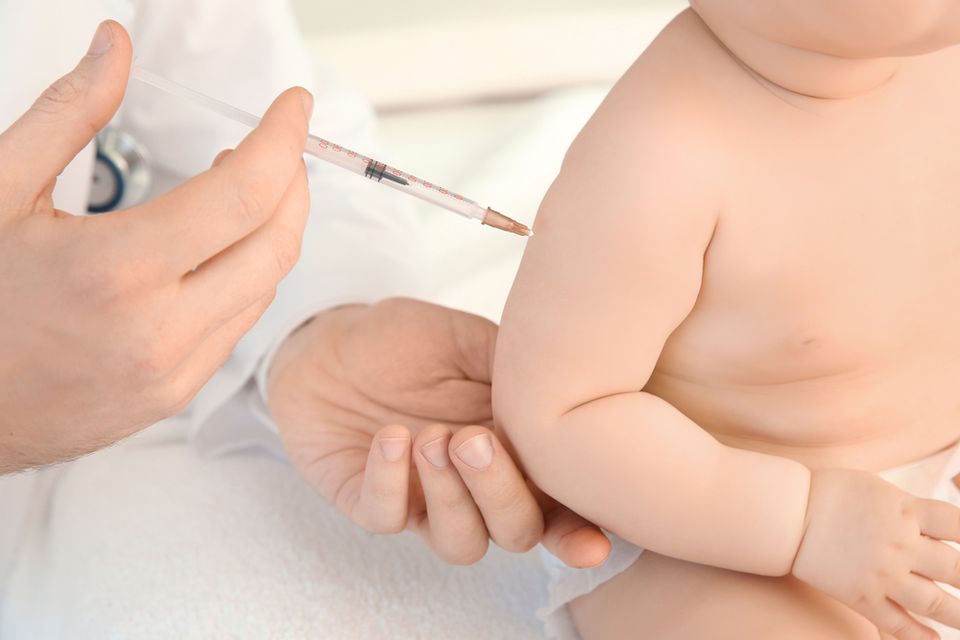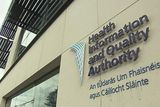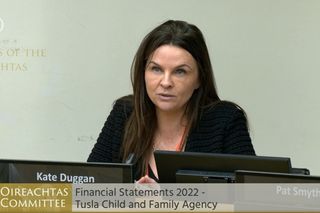Revealed: Children got double dose of 'narcolepsy' jab
Controversial swine flu vaccine was re-issued to prevent winter flu
Stock photo
A NUMBER of children received a double dose of the controversial swine flu vaccine, which is now at the centre of a global controversy over the sleep disorder narcolepsy, the Irish Independent can reveal.
The HSE provided doctors with stockpiles of the vaccine when supplies of the normal winter flu jab threatened to run short in 2011.
The vaccine Pandemrix, developed by GlaxoSmithKline (GSK) in Germany, was first used in Ireland in 2009-2010 during a threatened swine flu pandemic. But it was re-issued in Ireland amid fears of a shortage of the usual winter flu vaccine in 2011.
Around the same time, major concerns were beginning to emerge in other European countries, amid a sudden spike in cases of the sleep disorder narcolepsy.
Now the Irish Independent has learned of a young girl who received two doses of Pandemrix - one in 2009 and another unwittingly in 2011. She is now battling narcolepsy daily.
Her mother and older sister also received a Pandemrix dose in January 2011, believing at the time it was the ordinary winter flu vaccine.
The vaccine is at the centre of a global narcolepsy controversy, amid revelations the vaccine tricks the human immune system into mistaking the neuropeptide Orexin for the swine flu virus.
Catastrophic
Orexin is a vital regulator of sleep, and the consequences for sufferers can be catastrophic - they can collapse into deep sleep without warning, often in the middle of daily tasks. Some can even fall asleep while eating, with their mouths full of food. Many will suffer from narcolepsy and its symptoms for the rest of their lives.
To fast-track the vaccine into service in 2009, the Government granted GlaxoSmithKline a full indemnity as demanded by the drug firm.
The Government, like other European countries, were desperate to get a vaccine into service at the height of the 2009 swine flu, or H1N1, scare after the World Health Organisation warned of a pandemic.
"Due to ongoing litigation in Ireland concerning Pandemrix and other confidentiality commitments, we are not able to comment," a GSK spokesperson said.
The Irish Independent has now learned the Pandemrix problem facing the State was compounded by the decision in 2011 to use up vaccine stockpiles when doctors ran short of normal winter flu jab.
It is feared others may have unwittingly received doses of Pandemrix but have not yet displayed symptoms of narcolepsy.
In some cases, narcolepsy can manifest itself many years later, such as during puberty.
A test case is currently before the High Court over an alleged breach of duty of care over the provision of Pandemrix with the HSE, Health Minister, State drug agency and GSK as defendants.
Suffers
The young woman involved claimed she suffers from narcolepsy, cataplexy and fainting fits as a result of receiving the vaccine in 2009. Liability has not been conceded.
In the UK, one test case already resulted in a payment of £120,000 (€134,000) to a 12-year-old boy who developed narcolepsy after receiving the swine flu jab.
Almost 100 further cases are expected before the Irish courts in the coming years.
Tens of thousands of doses of Pandemrix were initially offered nationwide by the HSE in 2009 and into 2010. In March 2010, the HSE advised a halt to the use of Pandemrix.
However, just eight months later, the HSE faced a problem with a threatened shortfall of normal winter flu vaccines.
With significant stocks of Pandemrix still unused, on January 7, 2011, the HSE re-issued Pandemrix as a replacement flu vaccine if other supplies ran out. However, major medical investigations were already under way since August 2010 into possible side-effects from the vaccine in Sweden, Finland and Norway.
Finland's National Institute for Health and Welfare (NIHW) and Sweden's Medical Products Agency launched separate probes in August 2010 amid mounting reports of narcolepsy in youngsters who had received the vaccine. However, no formal study results were available until early 2011.
In a January 2011 letter, the HSE National Cold Chain Service confirmed it was re-issuing Pandemrix supplies given concerns over a winter flu vaccine shortfall. The HSE letter added the winter flu vaccine should be prioritised for pregnant women, and children aged from six months to 18 years in medically at-risk groups.
In late February 2011, Finland's NIHW announced a spike in narcolepsy cases and a suspected link between Pandemrix and the sleep disorder.
On March 28, just 11 weeks after its Pandemrix re-issue letter, the HSE ordered a halt to all use of the vaccine on foot of the NIHW report.
Letter
"I am sure you are aware of reports from Finland and more recently from Sweden regarding a possible association between the use of Pandemrix and the onset of narcolepsy in young people," a senior HSE official advised in a letter to clinics.
"In early January, I advised you that Pandemrix was only recommended if you had a shortage of seasonal flu vaccine. As additional stocks of seasonal flu vaccine were delivered to all sites that requested them from the end of January, there has been no requirement to use Pandemrix in any age group."
However, despite that HSE statement, at least three people received the Pandemrix vaccine as the winter flu jab.
The campaign group Sound (Sufferers Of Unique Narcolepsy Disorder) fears there are many more.
One little girl received her first dose of Pandemrix on November 16, 2009, and then a second dose of Pandemrix on January 18, 2011, 11 days after the HSE letter was issued advising GPs to use the vaccine in case of a shortfall of the normal flu vaccine. The Irish Independent has seen the youngster's vaccine record.
Studies by the 'British Medical Journal', the European Medicines Agency and NIHW found that children vaccinated with Pandemrix have a 13.9 times higher risk of narcolepsy than unvaccinated children.
A report commissioned by the Irish Government in 2012 further verified these findings. However, the 2012 report was not a definitive medical study.
Sound now provides support for over 90 Irish families so far affected by the vaccine. It wants the State to provide a support pathway for children and young adults without each having to be assessed on an individual basis for such vital resources.
Taoiseach Leo Varadkar was recently challenged in the Dáil over the Pandemrix issue by the Independent TD Clare Daly. He said his understanding was that a definitive medical study link between the vaccine and narcolepsy had not yet been confirmed.
"It is part of a bigger issue of how we deal with medical harm and medical negligence," he said. "The last time I studied that topic and got a briefing on it, my understanding was that there wasn't sufficient epidemiological evidence to show that vaccine caused the harms that were claimed. But I will take a look at it again because it is not something I have had any engagement on in these two years."
Ingredient
However, Sound is demanding an explanation as to why the Government opted for the German-made vaccine now at the centre of the narcolepsy controversy when a second vaccine, manufactured in Canada, was also available.
A single extra ingredient in the German-made vaccine is believed to be the source of the narcolepsy issue. The Canadian vaccine has not been linked with major narcolepsy issues.
"New sufferers are still presenting," warned Tom Matthews, one of Sound's founders.
"Sound has always stated that it is not anti-vaccine, and that the Pandemrix scandal was a result of the State rushing to get whatever vaccine it could and that it was acting with the best intentions.
"However, from the start, their response to what transpired has been painfully slow and this has been an extremely difficult and protracted process for the families involved.
"We believe it is way past time for the State to finally step up on this issue and to fulfil the duty of care it is morally bound to provide to the children and young adults who have been injured by the State."
Mr Matthews said the case highlighted by the Irish Independent was "another tragic example of the ongoing scandal of Pandemrix".
The US-based Centre for Disease Control (CDC) ordered a full study into the swine flu vaccine. However, it found no link between the Canadian vaccine and narcolepsy.
Critically, the CDC confirmed that Pandemrix was never licensed for use in the US.
However, a HSE spokesperson said it had only sought tender applications from pandemic vaccine manufacturers in Europe and whose products were licensed by the European Medicines Agency (EMA).
"The HSE only procured pandemic vaccines that were licensed by the EMA. Pandemic vaccine which was manufactured in Canada was not licensed by the EMA," a HSE spokesperson said.
Join the Irish Independent WhatsApp channel
Stay up to date with all the latest news















